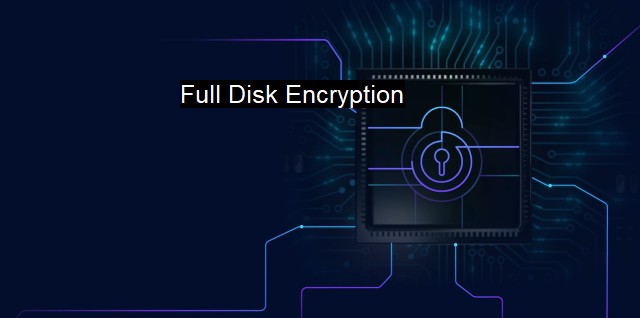What is Full Disk Encryption?
Ensuring Complete Data Protection: Full Disk Encryption in Cybersecurity Explained
Full disk encryption is a popular data protection methodology widely used in the field of cybersecurity. This protective mechanism uses cryptographic techniques to convert data on an entire hard drive into a form that cannot be understood without a decryption key. Even when the disk gets lost or stolen, without the decryption key, the decoding becomes near to impossible, providing an added layer of security against unauthorized access and data breaches.Encrypting the entire hard disk seems necessary in an age where cyber threats and attacks are increasing exponentially. It's a solid defense mechanism that boosts our existing security frameworks by making unauthorized data consumption impossibly hard for cybercriminals. The demands of industries where protecting sensitive information is very crucial such as finance, health, defense, IT, and education strongly advocate for deploying robust security techniques like full disk encryption.
The application of full disk encryption extends to devices apart from computers like smartphones and PDAs. When implemented, each disk sector is encrypted, including unused spaces, leaving no data in plain view. The full disk encryption works either at the hardware level or the software level. Hardware-level encryption is done through either a host hardware adapter or drive hardware. As it's pre-boot, it requires authentication during boot-up and before loading the operating system. In contrast, software encryption obtains the power of encrypting the disk data from a software product and encrypts data after the operating system is booted.
Regardless of the methods, the objective remains unaltered, to protect confidentiality and achieve data at rest security. Each bit of data, directories, files, metadata, free spaces, everything gets encrypted, thus eventually debarred from rogue accessibility. Perhaps the biggest advantage of full disk encryption is its restraint to provide data to anyone who isn't authenticated even if they physically have the disk.
Akin to the added security that this methodology offers, the safeguarding remains intact even if the hard disk changes systems. This means that, even if someone removes your encrypted hard disk and plugs it into their system, the data cannot be read or interpreted without possessing the crucial decryption code.
To elaborate on this mechanism from an antivirus standpoint, we can consider full disk encryption as a complementary layer of security that works well with antivirus software rather than a standalone solution. While the antivirus begins to work as soon as the system starts up, scrubbing of any harmful malware or virus, the full disk encryption safeguards the data even before the system boots up. Apart from offering high-level protection against prominent threats, it also reduces the risk of unnoticed and subtle security breaches.
Though full encryption offers robust security, occasional decryption for full disk scan might be needed because many malware and viruses disguise themselves as legitimate codes and remain dormant until evoked. While the anti-virus might seem unable to identify the threats, upon decryption, antiviruses can perform a full scan and discourage any potential threats.
Full disk encryption is a fundamental cybersecurity mechanism that provides an impermeable layer of protection by encrypting all on-disk data. It's a powerful deterrent for data breaches, particularly for devices that can be physically lost or stolen easily. Along with strong antivirus software, adopting full disk encryption can lead us to a comprehensive security framework that guards against both malicious programs and unauthorized data accessibility. While it might seem complicated and overwhelming on the technical front, the layers of safety that it adds to data protection make it worth consideration and implementation.

Full Disk Encryption FAQs
What is full disk encryption?
Full disk encryption is a cybersecurity technique that encrypts all the data stored in a disk or device, making it unreadable and inaccessible to unauthorized users. It helps protect sensitive information in case the device is lost, stolen, or hacked.What are the benefits of full disk encryption?
Full disk encryption provides several benefits, including enhanced data security and confidentiality, protection against theft or loss, compliance with regulatory requirements, and reduced risk of data breaches or cyberattacks.How does full disk encryption work with antivirus software?
Full disk encryption and antivirus software work together to provide comprehensive data protection. While full disk encryption encrypts all the data on a device, antivirus software detects and removes malware, viruses, and other security threats that may compromise the system. Together, they provide a layered defense against cybersecurity threats.What are some best practices for implementing full disk encryption?
To implement full disk encryption effectively, some best practices include choosing a strong encryption algorithm, using multi-factor authentication for access, implementing regular backups, and testing the encryption process to ensure its effectiveness. It is also important to train employees on how to use and maintain the encryption system.| | A | | | B | | | C | | | D | | | E | | | F | | | G | | | H | | | I | | | J | | | K | | | L | | | M | |
| | N | | | O | | | P | | | Q | | | R | | | S | | | T | | | U | | | V | | | W | | | X | | | Y | | | Z | |
| | 1 | | | 2 | | | 3 | | | 4 | | | 7 | | | 8 | | |||||||